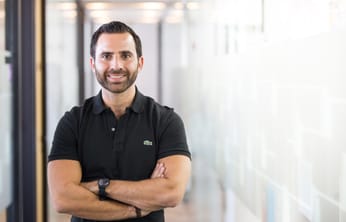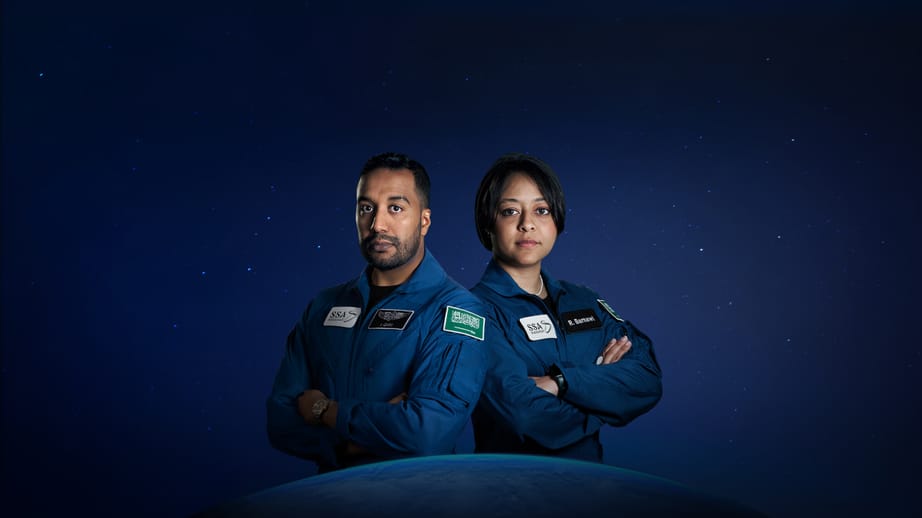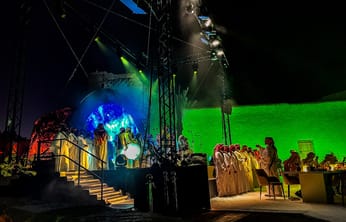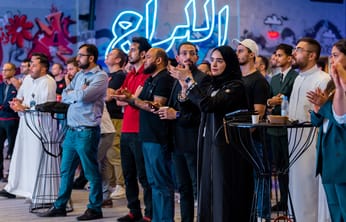
Big Vision, Bold Moves
Saudi Arabia’s AI ambitions are impossible to ignore With staggering investments, bold initiatives and a long-term vision rooted in

Saudi astronauts Rayyanah Barnawi and Ali Alqarni make history in giant leap for the kingdom.
From earthbound dreamers to cosmic voyagers
Four decades on since the Kingdom’s first foray into space, Saudi Arabia’s narrative took another historic leap in 2023 as Rayyanah Barnawi and Ali Alqarni joined the Axiom-2 mission’s four-person crew, marking a successful visit to the International Space Station (ISS).
For the uninitiated, the ISS is a multi-national collaborative project and orbiting laboratory that enables scientific research in the unique microgravity environment of space, crucial for advancing space exploration, technology, and our understanding of Earth and the universe. Only 263 individuals from 20 countries have ever visited the ISS.
“Space and I, we ran in parallel, until we crossed paths,” Alqarni says, reflecting on his journey that began beneath the starlit skies of Saudi Arabia’s southern region. “You can see whole stars there, and that triggered my curiosity as a child. I remember asking my science teacher at school why one star is brighter than the other. He gave me an initial answer but did not fulfill the depth of my inquisitiveness. I researched how to be an astronaut, but back then, we didn’t have an astronaut program in Saudi Arabia.”
Alqarni’s pursuit of knowledge beyond the confines of classrooms and textbooks drove him to join the Royal Saudi Air Force as a fighter pilot, aiming to soar as close as possible to the skies. But his quest took a pivotal turn during his training with the US Air Force. A trip to the Houston Space Center and a discussion with an ex-fighter pilot who had transitioned into an astronaut with the US’ National Aeronautics and Space Administration (NASA) about the pathway to becoming one changed the course of his life. Years later, his childhood dream became a reality when he was chosen to train as an astronaut by the Saudi Space Agency.
Parallel to Alqarni’s story is that of Barnawi, whose curiosity was nurtured from a young age. “As a little kid, I was like a little explorer who loved to know more about my surroundings and how things worked,” she says. Her father, a chemical engineer, became her greatest advocate, instilling in her the ethos to seek answers independently. “He taught me that you have to look for the answers yourself, not wait for someone to feed them to you,” she says. “That built the explorer’s spirit in me, and it made me interested in trying to solve things in a creative way. Throughout my education, I was really interested in doing research because it fulfilled that feeling in me.”
This foundation of exploration and problem-solving led her to earning a master’s degree in biomedical sciences, and further dedicate herself to research pressing medical challenges, particularly focusing on breast cancer and cancer stem-cell studies. Yet, an unexpected chance beckoned, promising to extend her impact beyond terrestrial confines. “This opportunity made it possible to not only help patients in Saudi Arabia, but also to conduct research and experiments in the most advanced lab in the world– orbiting Earth,” she says.
Conducting research in space serves the “mutual benefit of all human- kind,” she adds. As such, Barnawi’s engagement in these experiments not only distinguishes her as a trail- blazing researcher, but also sets her apart as the first Saudi –and the first Arab– woman to be on board the ISS, marking a profound leap forward for women and the region in space exploration. Pursuit of the unknown The term “astronaut” derives from the Greek words meaning “star sailor,” painting a vivid image of voyagers navigating the cosmos. But what is often misunderstood about space exploration is its vast potential to solve major challenges on earth, and the profound economic benefits derived from its technological advancements.
Since 1976, NASA has identified over 2,000 spin-offs, impacting diverse sectors including health and medicine, food production, agriculture, transportation, manufacturing, and public safety. Here, a “spin-off” refers to technology initially developed for NASA missions that has subsequently found commercial application, enhancing various aspects of everyday life.
Notable examples of spin-offs include water filtration systems, prosthetic limbs, solar panels, memory foam, and lenses that resist scratching, now commonplace in eyeglasses and smartphone displays. Other contributions include cochlear implants and, more recently, the development of ventilators critical in treating COVID-19 patients that aided in pandemic response, illustrating the ongoing impact of space research.
The Saudi astronauts conducted groundbreaking research during their mission to the ISS last year including work in health sciences and weather technology. Among the diverse experiments was an exploration of cloud seeding, a process being studied in space for the first time under microgravity.
This research aims to pave the way for weather control technology to generate artificial rain in future colonies on the Moon and Mars. The team also leveraged the unique conditions of space to advance the reprogramming of skin cells into pluripotent stem cells. This technique, which transforms fibroblasts to produce a variety of tissue types such as heart, brain, and blood cells, holds promise for regenerative medicine. The mission also included investigations into stem cell models to enhance cancer prediction and prevention strategies.
Additionally, experiments focused on the behavior of bioengineered liver and kidney tissues in space, particularly examining how microgravity affects the development of vascular networks within these tissues. The success of these experiments could revolutionize the bioengineering of tissue “building blocks,” offering new solutions for organ transplantation by bridging the gap for patients waiting for donor organs.
“If 60 years ago humans were not curious enough to explore space, we wouldn’t have some of the technologies that we’re using today,” Barnawi says. “Each year, nearly 80 million people are infected with immune diseases that are incurable. During our mission, we have worked on immune cells that we have grown in the ISS for the first time in his- tory. We also subjected those cells to different unique treatments to understand the behavior of cells in microgravity and how that technology could be developed in space to help humankind to overcome chronic diseases such as inflammations and cancers.”
Alqarni worked on experiments delving into the effects of micro-gravity on the human body, particularly focusing on the brain and nervous system. “Understanding the potential side effects on the human body is fundamental for mitigating risks on extended missions to the moon or Mars,” he explains. Additionally, Alqarni contributed to a physics experiment on cloud seeding. “We explored the feasibility of generating artificial rain on the moon or Mars,” he says, emphasizing the importance of water as a resource for future extraterrestrial settlements. “With desertification affecting 70% of countries on earth, if we increase the efficiency of making artificial rain, that could also help us benefit humanity.”
On the broader impact of space exploration, he added that venturing into space satisfies a deeper purpose of discovery. “I think we are naturally curious as human beings,” he says. “We need to go to space to fulfill our curiosity, to try to look for answers, and try to figure out our place in the universe. And, the big question: is there life beyond earth?”
‘A country for dreamers’
PwC predicts the global space sec- tor will exceed $1 trillion by 2030, reflecting a growth of 186% from 2020’s market size. Projected to surge to $75 billion by 2032, the Middle East’s space industry’s value is on an upward trajectory, according to a white paper published by Euroconsult in January.
In fact, the sector is poised for a 92% increase in investment over the next decade. Having already tripled over the past decade to an impressive $25 billion in 2023, the regional space economy is anticipated to represent 8.5% of the global market by 2030. This growth underscores the urgent need for talent development within the region’s industry.
In response to this need, the Saudi astronauts team also worked to encourage young Arabs towards careers in science, technology, engineering, and mathematics (STEM). Their efforts included direct interactions with approximately 12,000 students spread over 47 different locations throughout the Kingdom, with the astronauts’ activities reaching millions more through online platforms. “I always like to say that Saudi Arabia is the land of opportunities, and it’s the country for dreamers,” Barnawi says. “It’s our job now to spread that culture and spread that awareness, making sure that students understand that dreams could come true and that they should focus on any of the STEM fields that could help the space sector, and that the space sector is connected with all other sectors. Everything that we do in life is connected to space in some way.”
Dispelling prevalent stereotypes, Barnawi also underscored the parity of opportunities for both men and women in Saudi Arabia in both education and employment. “This is one of the misconceptions,” she says. “I was able to study the major that I wanted, and I am only one of many, many smart and accomplished women here in Saudi Arabia, who have represented the Kingdom in amazing ways in every sector, especially in engineering. We have lots of female innovators, researchers, and scientists who have been working for many years, are still working for the prosperity of Saudi Arabia. The support is mutual for women and men. All youth in Saudi Arabia are offered equal chances to pursue their dreams regardless of gender, and we can now see that is true even when we want to go to space.”
Giant leap for the Kingdom
But Barnawi and Alqarni believe the journey has brought them more than just scientific insights from experiments. The Saudi astronauts found profound perspectives from their unique vantage point of the cosmos aboard the ISS. “It was night time, so everything was glowing with the lights of the cities,” Barnawi says, vividly recalling her first sight of the Kingdom from space. “We were able to see the west coast of the Red Sea. And a few minutes later when the sun rose again, it’s a different view, because you are able to see how a thin layer of atmosphere is protecting the earth. We have been trained for all kinds of emergencies on the ISS, which have to do with simple things that we take for granted here on earth like breathing and protection from radiation. So, I guess for me, that was the takeaway: to protect our home planet, and that this planet is for all humankind, and our every single act will affect it.”
Echoing Barnawi’s poignant sentiment, Alqarni called the experience “like a dream.”
“It’s surreal to see earth [from space], like brown and green and blue and then suspended in the darkness,” he says. “I never stopped smiling after I saw it, because you kind of come to peace with yourself, and want everybody to be peaceful and work together. I think this is the beauty of space– that it unifies people, and countries, and that nations hold hands to work together to achieve one common goal, which is to benefit humanity. That is a noble message, I think, to spread out there.”
Megha Merani is an independent journalist with more than 10 years of newspaper, magazine and web reporting experience in the Middle East, writing hard news, investiga- tive reports, features and opinion pieces. Her passion for storytelling coupled with a proven instinct for identifying talk-generating issues has resulted in breaking stories and insightful features that have made local, regional and international headlines. Her work has been published across Thomson Reuters, Zawya, Bloomberg Middle East, Gulf News, former local daily 7DAYS, and government publications.
Discover the most outstanding articles.اكتشف أبرز المقالات.

Harnessing the power of digital twins to reimagine cities across the KSA and beyond. According to PwC’s 2022 report,

How Riyadh-based The Garage is contributing to a flourishing startup culture in Saudi Arabia In the heart of Riyadh, nestled